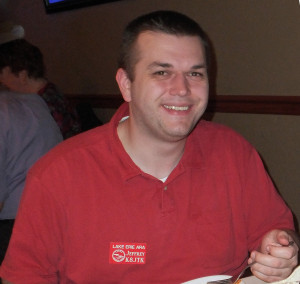One of the responsibilities of the Technical Coordinator in the Ohio Section is to submit something for the Section Journal. The Section Journal covers Amateur Radio related things happening in and around the ARRL Ohio Section. It is published by the Section Manager Scott – N8SY and articles are submitted by cabinet members.
Once my article is published in the Journal, I will also make it available on my site with a link to the published edition.
You can receive the Journal and other Ohio Section news by joining the mailing list Scott has setup. You do not need to be a member of the ARRL, Ohio Section, or even a ham to join the mailing list. Please sign up!
If you are an ARRL member and reside in the Ohio Section, update your mailing preferences to receive Ohio Section news in your inbox. Those residing outside the section will need to use the mailing list link above.
Updating your ARRL profile will deliver news from the section where you reside (if the leadership chooses to use this method).
Go to www.arrl.org and logon.
Click Edit your Profile.
You will be taken to the Edit Your Profile page. On the first tab Edit Info, verify your Email address is correct.
Click the Edit Email Subscriptions tab.
Check the News and information from your Division Director and Section Manager box.
Click Save.
Now without further ado…
Read the full edition at: http://arrl-ohio.org/news/OSJ-September-17.pdf
THE TECHNICAL COORDINATOR
Jeff Kopcak – TC
k8jtk@arrl.net
Last couple articles have been features so this month is a lot of odds-and-ends…
System Fusion
Last month’s article covering many System Fusion issues sparked some feedback as one might imagine. It was split.
One group in the section was using an external controller and was having a DR-1X repeater lock-up problem. They troubleshot the issue and with “additional circuity” resolved their issue. One disputed my assertion the repeater is two FTM-400 radios, but didn’t provide any details to the contrary. Having opened up LEARA’s DR-1X and upgraded the firmware, one radio looks exactly like the 400 (minus the speaker). Additionally, the firmware upgrade process was identical to my 400. Arguably, the transmit radio could be different but it’s hard to really tell with the heatsink mounted on top.
On the opposite end, a club in the section is completely frustrated with how Yaesu treated them as customers. They’ve attempted to call and email no less than 6 Yaesu representatives asking for details on promotions, hardware specifications, or answer to questions but never heard a word. They believe ‘Yaesu has lost any competitive edge they had by flooding the market with Fusion gear.’ Though I agree, I have not experienced this particular problem with my inquiries to support. My emails have been answered within a day or so – usually confirming suspicions I heard elsewhere. Seemingly ignoring customers is bad for business. Though customers feel they are being ignored, it may be a management attempt to better coordinate internal communication before going public. You’re doing it wrong, but it is a possibility. As pointed out previously, statements of fact made countless times are suddenly reversed and changed at release.
To clarify a point, the FTM-400 radio does operate both A & B sides 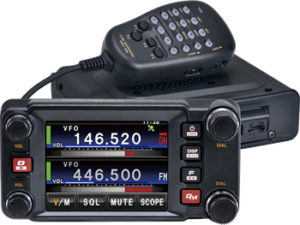 of the radio simultaneously. My issue is, for their high-end offering of a mobile radio, it should be able to operate Fusion from both A & B sides of the radio at the same time. It does not. The A side can operate Fusion digital or FM. B only operates FM. Operating Fusion digital from both sides is one nice feature of the FT2D.
of the radio simultaneously. My issue is, for their high-end offering of a mobile radio, it should be able to operate Fusion from both A & B sides of the radio at the same time. It does not. The A side can operate Fusion digital or FM. B only operates FM. Operating Fusion digital from both sides is one nice feature of the FT2D.
It didn’t take long before I started hearing the DMR arguments. DMR does have issues too but I see them as growing pains. It’s not: ‘this crashes, this locks up in transmit, this doesn’t work until you get a factory upgrade, need to spend $$$ to work around a shortcoming, upgrade to get the full power output, something can’t be fixed because there is no published specification…’ the list goes on. I’ve covered DMR issues here before and have noted most of them in my DMR Terminology and Programming a Code Plug learning series: http://www.k8jtk.org/category/amateur-radio/dmr-in-amateur-radio/.
Background checks, public service, & saving lives
The era of submitting to a background and credit check before helping out with fund-raising public service events is upon us. The local Multiple Sclerosis Society in Cleveland hosts a 150 mile (or so) bike ride every year. This used to be called “Pedal to the [Cedar] Point” but was renamed “Buckeye Breakaway” when the ride changed destinations to Ashland University. Last year, the MS society pushed for all volunteers to run a full background check. This included all ham, SAG (Support and Gear), and medical units – whether they were mobile or stationary at rest stops. Failing to complete the required check or failing the check would mean that person couldn’t volunteer or participate. This request was sprung on the ham and medical coordinators a few weeks out form the event. Citing time constraints and the amount of push back from volunteers, eventually the required check was no longer required but not after some had already completed the investigation.
This year, the MS society required a background investigation and proof of liability insurance for SAG drivers. Though I was not transporting riders, I too had to submit because I was the shadow of an MS staff person for the event. The investigation service stated a ‘credit check’ would be part of the reporting, though the society said it would not be a factor for eligibility.
Like many organizations, the MS Society is going through its share of layoffs, reorganizations, and centralization. The Cleveland chapter had little recourse since the background check was mandated from HQ. I suspect this will become the norm rather than the exception in the legal, CYA, society we live in. It sure takes the fun out of doing a public service event and not sure I want to give up that much personally identifiable information again for a fundraiser event. Then again, Equafax hands out PII data to anyone who can gain access to their systems.
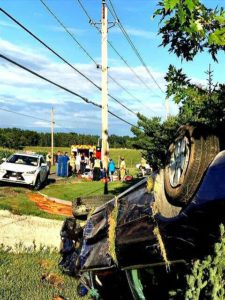 That issue aside, a real life threatening event happened. Ham and medical volunteers dealt with a roll-over accident involving one of the cyclists in the event, a utility pole, and a parked car – all because of an impatient driver. This happened in Medina County near Valley City. The accident was radioed in by a ham volunteer. Other hams were on scene along with the Northeast Ohio Medical Response Corps to triage the situation. NEOMRC is a group of volunteers who provide medial support services for events and nearly all are licensed hams. The injured cyclist was life-flighted to a nearby hospital. The driver, who caused the accident, left the scene. By late afternoon, the story was all over the local news: http://fox8.com/2017/08/05/cyclist-struck-by-car-during-race-in-medina-county/. Fortunately, no one was killed. Img: Brunswick Hills Firefighters.
That issue aside, a real life threatening event happened. Ham and medical volunteers dealt with a roll-over accident involving one of the cyclists in the event, a utility pole, and a parked car – all because of an impatient driver. This happened in Medina County near Valley City. The accident was radioed in by a ham volunteer. Other hams were on scene along with the Northeast Ohio Medical Response Corps to triage the situation. NEOMRC is a group of volunteers who provide medial support services for events and nearly all are licensed hams. The injured cyclist was life-flighted to a nearby hospital. The driver, who caused the accident, left the scene. By late afternoon, the story was all over the local news: http://fox8.com/2017/08/05/cyclist-struck-by-car-during-race-in-medina-county/. Fortunately, no one was killed. Img: Brunswick Hills Firefighters.
ISS SSTV
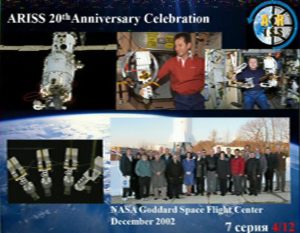 To commemorate the 20th anniversary of Amateur Radio on the International Space Station (ARISS), a slow scan TV event was held July 20th and ran for 3 days. During these events, SSTV transmissions originate from the International Space Station as it orbits in space. No special setup is required to copy the images. To receive the best images, Yagi antennas on a tracking tripod is best. I just use my external VHF antenna and let the radio listen for transmissions. Images sent featured different ARISS activities over the past 20 years. Check out the images 34 images I received: http://www.k8jtk.org/2017/08/03/sstv-transmissions-from-the-international-space-station-july-2017-edition/. If you want to get started in SSTV, check out the links to my getting started tutorial of MMSSTV in that post. I will also be giving my SSTV presentation at the Geauga Amateur Radio Association meeting on September 25, 2017 at 7:30 in the Geauga County Emergency Operations Center. More on the meeting: https://geaugaara.org/.
To commemorate the 20th anniversary of Amateur Radio on the International Space Station (ARISS), a slow scan TV event was held July 20th and ran for 3 days. During these events, SSTV transmissions originate from the International Space Station as it orbits in space. No special setup is required to copy the images. To receive the best images, Yagi antennas on a tracking tripod is best. I just use my external VHF antenna and let the radio listen for transmissions. Images sent featured different ARISS activities over the past 20 years. Check out the images 34 images I received: http://www.k8jtk.org/2017/08/03/sstv-transmissions-from-the-international-space-station-july-2017-edition/. If you want to get started in SSTV, check out the links to my getting started tutorial of MMSSTV in that post. I will also be giving my SSTV presentation at the Geauga Amateur Radio Association meeting on September 25, 2017 at 7:30 in the Geauga County Emergency Operations Center. More on the meeting: https://geaugaara.org/.
2017 Eclipse & WSPR
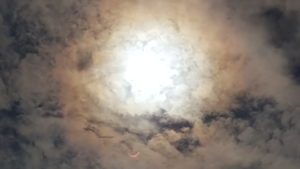 I contributed to the radio sciences taking place around the solar eclipse. I didn’t get to travel to an area of totality or even take off work. Instead I worked a number of the special event stations in the surrounding days. Still have to send away for my certificate. Since I didn’t take off work or do anything unusual, my contribution to the “eclipse QSO party” was to leave WSPR decoding signals and upload the spots. Scientists are hoping to learn more about eclipses and effects they have on the atmosphere and radio propagation from those spots.
I contributed to the radio sciences taking place around the solar eclipse. I didn’t get to travel to an area of totality or even take off work. Instead I worked a number of the special event stations in the surrounding days. Still have to send away for my certificate. Since I didn’t take off work or do anything unusual, my contribution to the “eclipse QSO party” was to leave WSPR decoding signals and upload the spots. Scientists are hoping to learn more about eclipses and effects they have on the atmosphere and radio propagation from those spots.
WSPR stands for Weak Signal Propagation Reporting Network. If you have WSJT-X installed, WSPR is included in that package. WSPR is intended to be a QRP mode because each receive and transmit window is 2 minutes. It works like a beacon network based on timed transmissions like JT65, JT9, and FT8. Each band has 200 Hz of bandwidth designated for WSPR. A transmitting station will digitally transmit their call sign, grid square, and dBm (power output). Similar to the JT’s, the signal report (DB), time difference between the two clocks, and drift are calculated by the receiving station. Decoded signals are uploaded as spots to the WSPR Net website. The data is crunched and used to draw real-time maps of propagation. More: http://wsprnet.org/
Technical Specialist Reports
In Technical Specialist news, Dave – KD8TWG held a “Test and Tune” night for LEARA. Communications and spectrum analyzers were brought in to tune radios that might be off frequency or show how much those Baofeng radios do transmit everywhere at once. Contact Dave or a section Specialist to bring this educational and eye-opening experience to your club meeting.
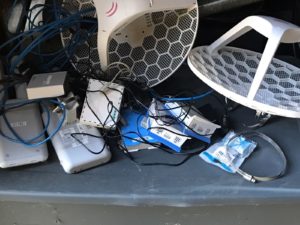 In addition, KD8TWG would like to thank everyone who came out and worked the 195th Great Geauga County Fair. Dave was in charge of the communications and networking for golf cart drivers who transported fair goers to and from their cars. Golf carts were equipped with APRS for location tracking. A WiFi network based on the Mikrotik NV2 protocol was built for two weeks. NV2 is a proprietary WiFi protocol based on TDMA in the 5.1-5.8 GHz range. The advantage of TDMA wireless is better throughput and lower latency in point-to-point or point-to-multipoint networks. Traditional WiFi is built on a Carrier sensed
In addition, KD8TWG would like to thank everyone who came out and worked the 195th Great Geauga County Fair. Dave was in charge of the communications and networking for golf cart drivers who transported fair goers to and from their cars. Golf carts were equipped with APRS for location tracking. A WiFi network based on the Mikrotik NV2 protocol was built for two weeks. NV2 is a proprietary WiFi protocol based on TDMA in the 5.1-5.8 GHz range. The advantage of TDMA wireless is better throughput and lower latency in point-to-point or point-to-multipoint networks. Traditional WiFi is built on a Carrier sensed  collision avoidance system where nodes transmit only when they sense the channel is idle. Dave points out, this is NOT mesh. Over the wireless network, they ran a phone system and IP cameras. The Sherriff’s Office was impressed with the video coverage and wants to run more cameras next year. By the numbers: 60 volunteers worked 1,284 hours, with just under 700 golf cart transports. Dave ate approximately 47,000 calories in fried food. Imgs: KD8TWG.
collision avoidance system where nodes transmit only when they sense the channel is idle. Dave points out, this is NOT mesh. Over the wireless network, they ran a phone system and IP cameras. The Sherriff’s Office was impressed with the video coverage and wants to run more cameras next year. By the numbers: 60 volunteers worked 1,284 hours, with just under 700 golf cart transports. Dave ate approximately 47,000 calories in fried food. Imgs: KD8TWG.
Technical Regulation Reform
An ARNewsline report (#2080) points out the FCC Technical Advisory Council is looking for opinions and suggestions to update existing technical regulations or to adopt new ones. “The FCC wants the council to single out any rules that are obsolete or in need of being brought up-to-date. The Council also wants comments on how the agency’s regulatory process on specific technical rules could become more efficient. The agency stresses that the issues being considered are those of a technical nature.” Thoughts or opinions can be filed in ET Docket 17-215 or with the ARRL. October 30th is the deadline. More: http://www.arrl.org/news/fcc-technological-advisory-council-investigating-technical-regulations
Foxhunts
I’ve only participated in two Fox Hunts. The first time, I came in dead last. Second time, came in second. No idea how that happened because no skills were honed at all. The Ham Radio 360 podcast had an episode with Larry Jacobs – WA7ZBO talking all about Fox Hunts. Surprising to me was the Tape measure antenna is very popular even among serious hunters. As for gear, an antenna, attenuator, and radio are needed. In the absence of an attenuator, your body could be used to attenuate signals. Larry talked about some dos and don’ts. He encouraged hamfests to hold hunts to ‘whet the appetite.’ The most popular hunts are races with mileage and time restrictions to keep things safe. Don’t make the hunt too hard where participants get discouraged and don’t want to ever participate again. Always use public property. Use common sense and don’t be a wise guy. For example, a convention had the fox located near the hotel pool. When someone asked what everyone was doing with antennas around the hotel, someone responded with ‘a Soviet Satellite with a radioactive payload went down near here.’ Guests couldn’t check out of the hotel fast enough. The hotel asked this group not to return. While funny, don’t be that guy. Instead have ARRL handouts and pamphlets about ham radio when someone asks. The episode can be found at: http://hamradio360.com/index.php/2017/07/25/ham-radio-360-fox-hunting-transmitter-bunnies-too/
Last Man Standing & Frequency TV shows
Many have heard by now the Tim Allen show “Last Man Standing” was canceled by ABC and possibly looking for a new home. Tim Allen plays a fictional ham radio operator using the call sign KA0XTT. The show was popular among politically conservative individuals and ham radio operators. According to ARNewsline (#2069), talks fell through for the show and it will not be returning with new episodes. The show will soon be removed from Netflix as 20th Century Fox struck a deal with Hulu for exclusive rights to their catalog, which includes Last Man Standing. Hulu is a premium service for streaming TV and moves. Channels carrying reruns include: CMT, Hallmark, Freeform, and The CW. Also on CW was the TV spinoff of the move Frequency, it too was canceled.
TYT MD-2017 Broken Antenna Connectors
If you purchased an early Tytera MD-2017 DMR dual-band radio and the antenna connector broke, contact your dealer. This appears to be a first-run issue and TYT has shipped replacement connector parts to their dealers. Replacing the connector requires opening the radio and soldering. If you’re not comfortable, ask if the dealer will do the work or swap the radio.
Thanks for reading, 73, and Go Tribe!… de Jeff – K8JTK
